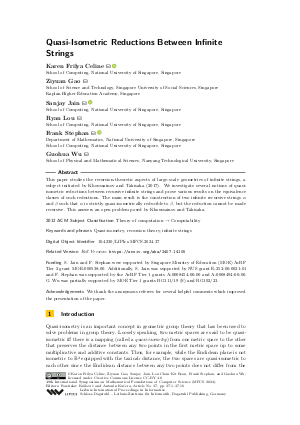Quasi-Isometric Reductions Between Infinite Strings
Authors
Karen Frilya Celine  ,
Ziyuan Gao,
Sanjay Jain
,
Ziyuan Gao,
Sanjay Jain  ,
Ryan Lou,
Frank Stephan
,
Ryan Lou,
Frank Stephan  ,
Guohua Wu
,
Guohua Wu
-
Part of:
Volume:
49th International Symposium on Mathematical Foundations of Computer Science (MFCS 2024)
Part of: Series: Leibniz International Proceedings in Informatics (LIPIcs)
Part of: Conference: Mathematical Foundations of Computer Science (MFCS) - License:
 Creative Commons Attribution 4.0 International license
Creative Commons Attribution 4.0 International license
- Publication Date: 2024-08-23
File

PDF
LIPIcs.MFCS.2024.37.pdf
- Filesize: 0.69 MB
- 16 pages
Document Identifiers
Related Versions
- Full Version https://arxiv.org/abs/2407.14105
Subject Classification
ACM Subject Classification
- Theory of computation → Computability
Keywords
- Quasi-isometry
- recursion theory
- infinite strings
Metrics
- Access Statistics
-
Total Accesses (updated on a weekly basis)
0PDF Downloads0Metadata Views
Abstract
This paper studies the recursion-theoretic aspects of large-scale geometries of infinite strings, a subject initiated by Khoussainov and Takisaka (2017). We investigate several notions of quasi-isometric reductions between recursive infinite strings and prove various results on the equivalence classes of such reductions. The main result is the construction of two infinite recursive strings α and β such that α is strictly quasi-isometrically reducible to β, but the reduction cannot be made recursive. This answers an open problem posed by Khoussainov and Takisaka.
Cite As Get BibTex
Karen Frilya Celine, Ziyuan Gao, Sanjay Jain, Ryan Lou, Frank Stephan, and Guohua Wu. Quasi-Isometric Reductions Between Infinite Strings. In 49th International Symposium on Mathematical Foundations of Computer Science (MFCS 2024). Leibniz International Proceedings in Informatics (LIPIcs), Volume 306, pp. 37:1-37:16, Schloss Dagstuhl – Leibniz-Zentrum für Informatik (2024)
https://doi.org/10.4230/LIPIcs.MFCS.2024.37
BibTex
@InProceedings{celine_et_al:LIPIcs.MFCS.2024.37,
author = {Celine, Karen Frilya and Gao, Ziyuan and Jain, Sanjay and Lou, Ryan and Stephan, Frank and Wu, Guohua},
title = {{Quasi-Isometric Reductions Between Infinite Strings}},
booktitle = {49th International Symposium on Mathematical Foundations of Computer Science (MFCS 2024)},
pages = {37:1--37:16},
series = {Leibniz International Proceedings in Informatics (LIPIcs)},
ISBN = {978-3-95977-335-5},
ISSN = {1868-8969},
year = {2024},
volume = {306},
editor = {Kr\'{a}lovi\v{c}, Rastislav and Ku\v{c}era, Anton{\'\i}n},
publisher = {Schloss Dagstuhl -- Leibniz-Zentrum f{\"u}r Informatik},
address = {Dagstuhl, Germany},
URL = {https://drops.dagstuhl.de/entities/document/10.4230/LIPIcs.MFCS.2024.37},
URN = {urn:nbn:de:0030-drops-205931},
doi = {10.4230/LIPIcs.MFCS.2024.37},
annote = {Keywords: Quasi-isometry, recursion theory, infinite strings}
}
Author Details
- School of Science and Technology, Singapore University of Social Sciences, Singapore
- Kaplan Higher Education Academy, Singapore
- Department of Mathematics, National University of Singapore, Singapore
- School of Computing, National University of Singapore, Singapore
Funding
S. Jain and F. Stephan were supported by Singapore Ministry of Education (MOE) AcRF Tier 2 grant MOE-000538-00. Additionally, S. Jain was supported by NUS grant E-252-00-0021-01 and F. Stephan was supported by the AcRF Tier 1 grants A-0008454-00-00 and A-0008494-00-00. G. Wu was partially supported by MOE Tier 1 grants RG111/19 (S) and RG102/23.
Acknowledgements
We thank the anonymous referees for several helpful comments which improved the presentation of the paper.
References
- Cristian S. Calude. Information and Randomness - An Algorithmic Perspective. Texts in Theoretical Computer Science. An EATCS Series. Springer, 2002. URL: https://doi.org/10.1007/978-3-662-04978-5.
- Michael Gromov. Groups of polynomial growth and expanding maps. Publications Mathématiques de l'Institut des Hautes Études Scientifiques, 53:53-78, 1981. URL: http://eudml.org/doc/103974.
-
Bernard R. Hodgson. Théories décidables par automate fini. PhD thesis, University of Montréal, 1976.

-
Bernard R. Hodgson. Décidabilité par automate fini. Annales des sciences mathématiques du Québec, 7(1):39-57, 1983.

- Bakhadyr Khoussainov and Anil Nerode. Automatic presentations of structures. In Proceedings of the International Workshop on Logic and Computational Complexity (LCC), pages 367-392, Berlin, Heidelberg, 1995. Springer Berlin Heidelberg. URL: https://doi.org/10.1007/3-540-60178-3_93.
- Bakhadyr Khoussainov and Toru Takisaka. Large scale geometries of infinite strings. In Proceedings of the 32nd Annual ACM/IEEE Symposium on Logic in Computer Science (LICS), pages 1-12, Reykjavik, Iceland, june 20-23 2017. IEEE Computer Society. URL: https://doi.org/10.1109/LICS.2017.8005078.
- Bakhadyr Khoussainov and Toru Takisaka. Infinite strings and their large scale properties. The Journal of Symbolic Logic, 87(2):585-625, 2022. URL: https://doi.org/10.1017/JSL.2020.70.
-
Stephen C. Kleene. Recursive functions and intuitionistic mathematics. In Proceedings of the International Congress of Mathematicians, volume I, pages 679-685, Cambridge, Massachusetts, U.S.A., 1952. American Mathematical Society.

-
Ryan Lou. Quasi-isometric Reductions Between K-ary Sequences. Bachelor thesis, National University of Singapore, 2019.

- Alexander G. Melnikov. Computably isometric spaces. Journal of Symbolic Logic, 78(4):1055-1085, 2013. URL: https://doi.org/10.2178/jsl.7804030.
-
Piergiorgio Odifreddi. Classical Recursion Theory: The Theory of Functions and Sets of Natural Numbers. Number 125 in Studies in Logic and the Foundations of Mathematics. Elsevier, North-Holland, Amsterdam, 1989.

-
Emil L. Post. Recursively enumerable sets of positive integers and their decision problems. Bulletin of the American Mathematical Society, 50:284-316, 1944.

-
Hartley Rogers, Jr. Theory of Recursive Functions and Effective Computability. MacGraw-Hill, New York, 1967.

-
Robert I. Soare. Recursively Enumerable Sets and Degrees - A Study of Computable Functions and Computably Generated Sets. Perspectives in mathematical logic. Springer, 1987.

